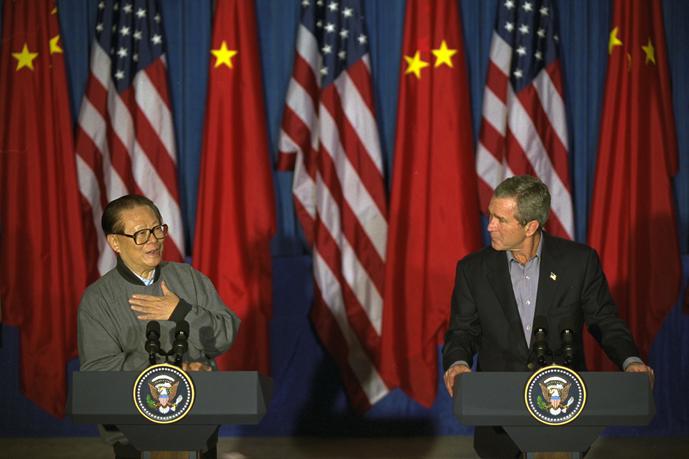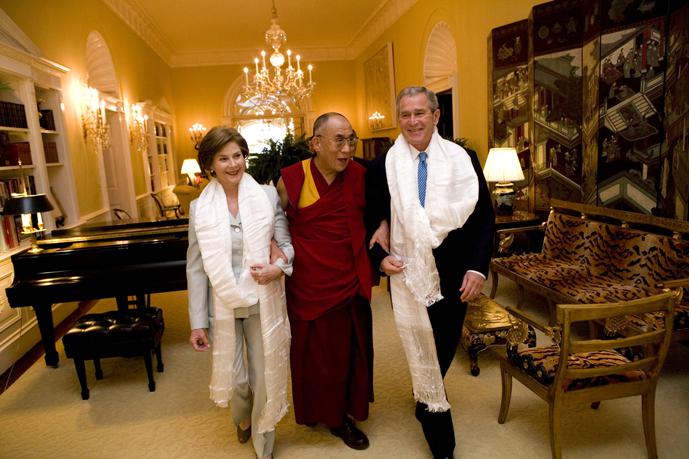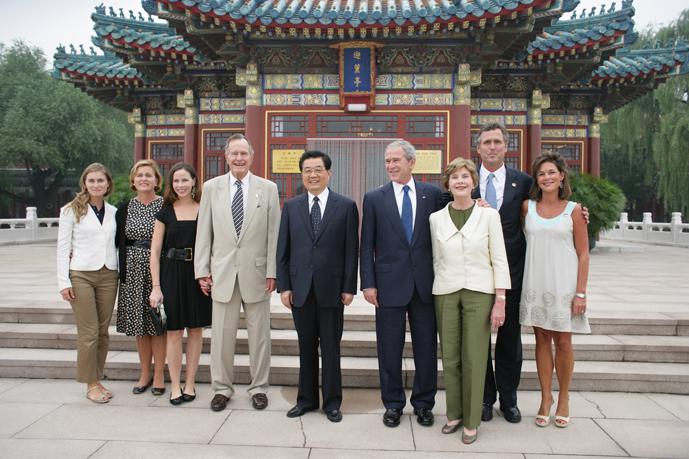States also tightened our sanctions on the North Korean banking system and sought to deny Kim Jong-il his precious luxury goods.
The pressure worked. In February 2007, North Korea agreed to shut down its main nuclear reactor and allow UN inspectors back into the country to verify its actions. In exchange, we and our Six-Party partners provided energy aid, and the United States agreed to remove North Korea from our list of state sponsors of terror. In June 2008, North Korea blew up the cooling tower at Yongbyon on international television. In this case, no further verification was necessary.
The problem was not solved, however. The people of North Korea were still starving and suffering. Intelligence reports provided increased evidence that North Korea was continuing its highly enriched uranium program, even as it claimed to be shutting down its plutonium reprocessing.
In the short run, I believe the Six-Party Talks represented the best chance to maintain leverage on Kim Jong- il and rid the Korean Peninsula of nuclear weapons. In the long run, I am convinced the only path to meaningful change is for the North Korean people to be free.

The freedom agenda was a sensitive subject with China. My policy was to engage the Chinese in areas where we agreed, and use this cooperation to build the trust and credibility we needed to speak plainly about our differences.
I worked to develop close relations with China’s leaders, Jiang Zemin and Hu Jintao. President Jiang and I got off to a rough start. On April 1, 2001, an American surveillance plane known as an EP-3 collided with a Chinese aircraft and made an emergency landing on Hainan Island. The Chinese pilot ejected from the cockpit and died. Our twenty-four-person crew was held at a military barracks on the island and interrogated. The Iranian hostage crisis was at the forefront of my mind. This was not the way I wanted to start my relationship with China.
After several agonizing days of trying to reach the Chinese, I connected with President Jiang, who was in Chile. The Chinese soon agreed to release the EP-3 crew. In return, I wrote a letter expressing regret over the death of their pilot and our landing on Hainan without verbal clearance. I later learned that China’s handling of the EP-3 crisis was based on the government’s belief that the Chinese people had perceived weakness in the response to America’s accidental bombing of the Chinese embassy in Belgrade in 1999. After the EP-3 incident, the Chinese sent us a $1 million bill for the American crew’s food and lodging. We offered them $34,000.
In February 2002, Laura and I made our first trip to Beijing. President Jiang was a cordial and welcoming host. After a banquet in our honor at the Great Hall of the People, he entertained the crowd with a rendition of “O Sole Mio,” accompanied by two beautiful Chinese women clad in military uniforms. His serenade was a big change from the previous year, when I couldn’t get him on the phone. It was a sign we were developing trust.

With Jiang Zemin.
That trust was strengthened by an understanding on Taiwan, the island democracy that had been governed separately from the mainland since Chiang Kai-shek clashed with Mao Zedong during the Chinese Civil War in 1949. Every time I met with Chinese leaders, I confirmed that America’s longstanding “one China” policy would not change. I also made clear that I opposed any unilateral change to the status quo, including a declaration of independence by Taiwan or military action by China.
When Hu Jintao took office, I was determined to forge a close relationship with him as well. Sixteen years younger than his predecessor, President Hu had an unexcitable demeanor and a keen analytical mind. Like many in the new generation of Chinese leaders, he was trained as an engineer. During a lunch in the East Room, I turned to him with a question that I liked to ask fellow world leaders: “What keeps you up at night?”

With Hu Jintao.
I told him I stayed awake worrying about another terrorist attack on America. He quickly replied that his biggest concern was creating twenty-five million new jobs a year. I found his answer fascinating. It was honest. It showed he was worried about the impact of disaffected, unemployed masses. It explained his government’s policies in resource-rich places like Iran and Africa. And it was a signal that he was a practical leader focused inward, not an ideologue likely to stir up trouble abroad.
I worked with President Hu to find common ground on issues from North Korea to climate change to trade. Expanding American access to China’s one billion potential consumers was a high priority for me, just as access to the U.S. market was essential for the Chinese. I also saw trade as a tool to promote the freedom agenda. I believed that, over time, the freedom inherent in the market would lead people to demand liberty in the public square. One of my first decisions was to continue President Clinton’s support for China’s entry into the World Trade Organization. To solidify our economic relationship, I asked Treasury Secretary Hank Paulson and Condi to create the Strategic Economic Dialogue.
One area of disagreement with the Chinese leadership was human rights. My focus was on religious liberty, because I believe that allowing people to worship as they choose is a cornerstone of the freedom agenda. In one of our first meetings, I explained to President Jiang that faith was a vital part of my life and that I studied the Word every day. I told him I planned to raise freedom of worship in our conversations. “I read the Bible,” he replied, “but I don’t trust what it says.”
I told both Jiang and Hu that religious believers would be peaceful and productive citizens, the kind of people who would make their country stronger. I told them that for China to reach its full potential, they needed to trust their people with greater freedom. I didn’t hector or lecture them; I let my actions send the message. Laura and I attended church in Beijing, met with religious leaders like Cardinal Joseph Zen of Hong Kong, and spoke out for the rights of Chinese underground preachers and worshippers, bloggers, dissidents, and political prisoners.
At the 2007 APEC Summit in Sydney, I told President Hu I planned to attend a ceremony where the Dalai Lama would receive the Congressional Gold Medal. The Buddhist leader was a source of distress for the Chinese government, which accused him of stirring up separatists in Tibet. I met with the Dalai Lama five times during my presidency, and I found him to be a charming, peaceful man. I told China’s leaders they should not fear him. “This is not meant as a slap at China,” I said, “but as a measure of my respect for the Dalai Lama and for the U.S. Congress. You know my strong belief in religious freedom.”

With the Dalai Lama.
“This is a politically sensitive issue in China,” President Hu replied. “… It will draw a very strong reaction from the Chinese people.” What he meant was that it would draw a strong reaction from the government, which did not want me to be the first American president to appear with the Dalai Lama in public.
“I’m afraid that I have to go to that ceremony,” I said.
I also had some good news to share. “How is your Olympic planning coming?” I asked, referring to the 2008 Summer Games, which China had been chosen to host.
He gave me an update on the construction process. I told him I was coming to the Games. I knew I would face pressure not to, and many would try to politicize the Olympics, but I promised he could count on me to attend. “I’ve got my hotel reservations already,” I joked. He looked relieved.
The Beijing Olympics were one of the highlights of my final year in office. I flew over on Air Force One with Laura and Barbara, my brother Marvin, my sister-in-law Margaret, and our friends Roland and Lois Betts and Brad Freeman. Mother, Dad, and Doro met us in China. Dad and I joined Ambassador Sandy Randt, who served in Beijing all eight years, to open a huge new American embassy. It was quite a change from the small diplomatic post Dad led thirty-three years earlier. In an extraordinary gesture of generosity, President Hu hosted a lunch for us all at the government’s Zhongnanhai Compound, a Bush family reunion like none before or since.

(
The Beijing Olympics turned out to be a phenomenal success—and a lot of fun. We were at the Water Cube when the men’s swimming team staged a dramatic comeback to edge out France for the gold medal in the freestyle relay. I dropped by to watch the impressive team of Misty May-Treanor and Kerri Walsh practice for their beach volleyball match. I made international news by giving Misty a playful slap on the back—a little north of the traditional target. We visited the locker room before Team USA and China squared off in the most-watched basketball game in history. The players couldn’t have been more gracious or impressive. “Hey, Pops!” LeBron James

